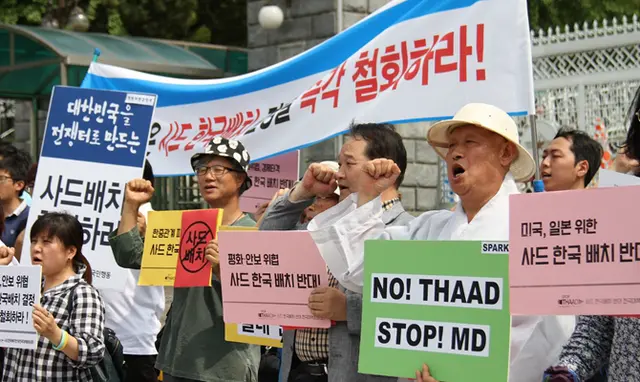The insistence of the U.S. to deploy advanced THAAD anti-missile system in South Korea represents an invitation to a new Cold War, experts in Egypt said.
Such a move by the U.S. mainly aims at stirring up troubles and unrest around Russia and China in an effort to maintain its domination over the world, according to experts.
"The insistence of the United States to deploy a missile shield in Northeast Asia, especially South Korea, means the beginning of a new cold war," former Egyptian deputy foreign minister Ahmed al- Ghamrawi told Xinhua.
He added that it is clear that there is an attempt to encircle China and Russian through deploying high-tech anti-missile bases around the two countries.
"American leaders believe that the two countries pose economic, political and military threats to the U.S. in particular and to the West in general, that is why they have decided to take this move," he explained.
He added that the United States started to realize the decline of its dominance, strength and economy, while the Chinese and the Russian roles are growing, which prompted Washington to move quickly on stirring up problems in the face of Beijing and Moscow.
Earlier this month, Seoul and Washington announced the agreement to install one THAAD battery in Seongju County, some 250 km southeast of the South Korean capital city, by the end of next year, as one way to counter the nuclear and missile threats posed by the Democratic People's Republic of Korea (DPRK).
THAAD is developed by the U.S. defense company Lockheed Martin. It is a U.S. Army anti-ballistic missile system designed to shoot down short and medium range ballistic missiles in their terminal phase.
A senior official of Seongju county (2nd L, front) attends a rally to protest against the deployment of the Terminal High Altitude Area Defense (THAAD) in Seoul, capital of South Korea, on July 21, 2016. Xinhua/Yao Qilin
It is composed of six mobile launchers, 48 interceptors and a radar and fire control system valued at about 1.3 billion U.S. dollars.
The deployment of the advanced U.S. missile defense system in South Korea is just a part of Washington's global anti-missile scheme.
China has expressed strong dissatisfaction with and resolute opposition to the THAAD deployment in South Korean territory as it damaged China's security interests and broke a strategic balance in the region, while Russia indicated a military response by deploying a missile unit in the Far Eastern region.
Washington is not currently seeking to get into a direct confrontation with China and Russia, al-Ghamrawi said, adding that the U.S. therefore pushes its allies play this role through deploying the THAAD system in South Korea as well as inciting the Philippines and Indonesia to stir up the South China Sea crisis.
"Publicly the U.S. and South Korea announce that the THAAD missile system is meant to counter the face DPRK missiles, but the truth is that it is meant to be against China," the former diplomat stressed.
Since 2012, the United States has been trying to place the THAAD system into South Korea, which experts said has limited effectiveness against missiles from the DPRK.
On a technical note, THAAD is designed to shoot down missiles at a relatively high altitude of 40 to 150 km, but the DPRK's rockets fly at a lower altitude of about 20 km, so the THAAD system might not be able to intercept them.
"China will not be led into a war. It has a big economy and it is keen to keep this economy growing. In addition, China always prefers to solve problems peacefully." al-Ghamrawi said to Xinhua.
However, the Chinese navy started a drill, which involved firing dozens of missiles and torpedoes, in the East China Sea, which might be seen as a message to the U.S. that its plans in the region cannot be easily implemented.
The navy said in statement that "the drill is aimed at honing the assault "intensity, precision, stability and speed" of troops amid heavy electromagnetic influences."
"An information technology-based war at sea is sudden, cruel and short, which requires fast transition to combat status, quick preparation and high assault efficiency," the statement added.
Meanwhile, Egyptian international relations expert at Al Ahram Center for Political and Strategic Studies, Saeed Lawendy, told Xinhua that the cold war is currently looming in northeast Asia.
"It is a cold war, but not the same ferocity of that in the fifties and sixties of last century, and the U.S. for its own good inciting regional countries to confront China and Russia is as well as a proxy way," he said.
Lawendy warned that the U.S. actions in Northeast Asia will block the regional attempts to contain tension with DPRK.
"Such actions may lead countries in the region to seek military solutions, which pose a dangerous threat to the whole region," he expected.
(APD)
 简体中文
简体中文

